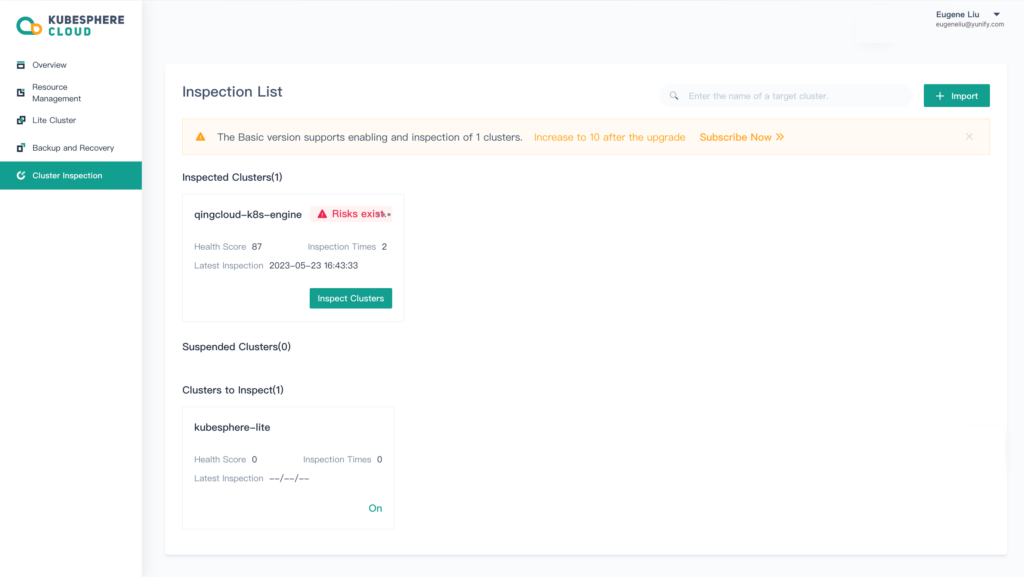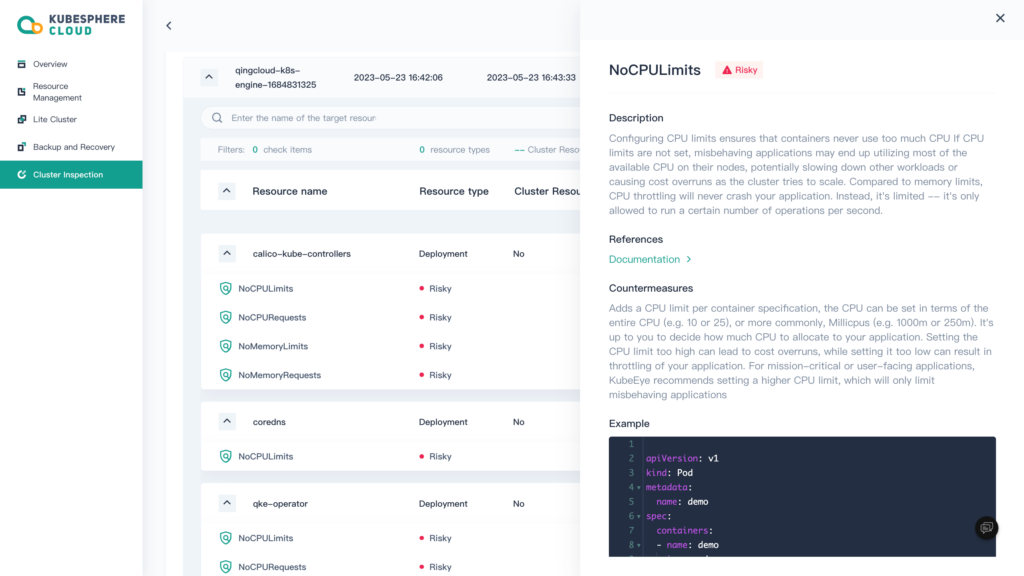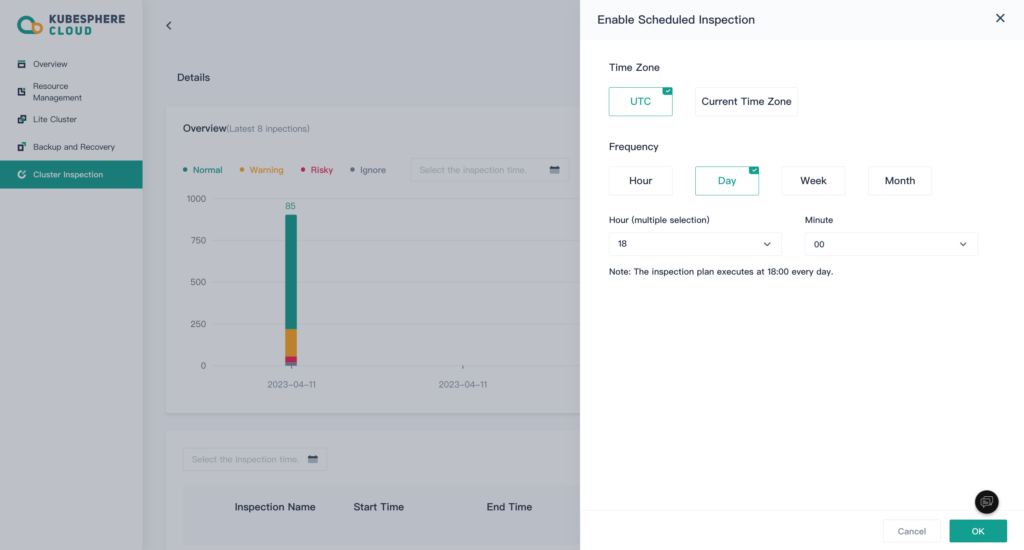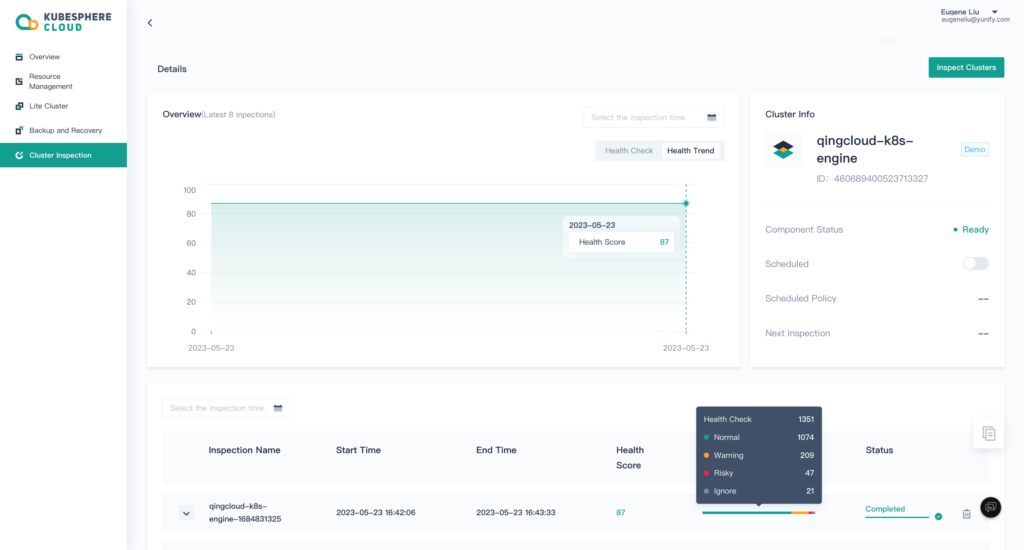Today, cloud-native architecture based on container technologies such as Kubernetes has become a widely popular new generation of enterprise IT infrastructure. In industries such as the internet, finance, and manufacturing, an increasing number of cloud-native applications are running in production environments.
As enterprises grow, the number and scale of Kubernetes clusters continue to expand, with cluster states constantly changing, components updating and upgrading, and various problems such as CPU exceptions, kernel deadlocks, unresponsive container runtime daemons, and abnormal etcd health plaguing cluster administrators.
KubeSphere Inspector, designed for Kubernetes clusters in multi-cloud environments, was officially released recently. It perfectly solves the pain points of cluster administrators by checking whether the configurations of Kubernetes cluster nodes, components, etc. comply with best practices in real-time or periodically. This helps users detect container vulnerabilities and exposures (CVEs) in cluster components, services, and ports; analyze operational risks in Kubernetes; and push reports to ensure continuous and stable business operations while minimizing enterprise risk.
The release of KubeSphere Inspector further enriches the KubeSphere cloud-native product matrix and accelerates enterprise cloud-native transformation together with KubeSphere Backup and KubeSphere Lite.
本篇目录
Feature Highlights
Compared to traditional inspection methods based on white-box monitoring of cluster data, KubeSphere Inspector can diagnose the health status of Kubernetes clusters with one click and has four significant features:
Unified Management of Kubernetes Clusters
Support unified management of Kubernetes clusters on any cloud, centrally monitor all inspection results, and configure periodic inspections, so that users have real-time control over the health status of clusters, nodes, and applications.

Commercial-grade Health Check
Fully detect business-level requirements of control plane and node issues, such as kube-apiserver, etcd, and kube-controller-manager, CPU utilization, memory and disk pressure, and validation YAML specifications.

Periodic Risk Check
Supports scheduled (hourly, daily, weekly, monthly) health checks for cluster nodes and services and outputs inspection reports to periodically assess cluster health status and promptly address any abnormalities or risks.

Visualized Display and Reports
Supports score of cluster health with one click, visualized display of inspection results, export of inspection results, and periodic report by email, which greatly helps users monitor cluster health and change modifications when necessary.

Use Cases
KubeSphere Inspector can greatly help both cluster administrators and developers by reducing manual checks and troubleshooting efforts while ensuring the safe use of Kubernetes. The main application scenarios are:
Routine O&M
Through KubeSphere Inspector, users can eliminate security vulnerabilities and blind spots that occur during the routine operation of Kubernetes clusters, which ensures the availability and business continuity of applications on Kubernetes with the established DevSecOps mechanism.
Security and Compliance Auditing
When third-party evaluation agencies require security and compliance audits during project acceptance, KubeSphere Inspector can be used to proactively detect container vulnerabilities and compliance of security configurations and applications during project acceptance to mitigate security risks in advance.
Environment Scanning and Reporting
Based on KubeSphere Inspector, users can scan their Kubernetes clusters or links regularly and periodically, such as Etcd cold/warm backup multi-cluster coverage, risk control configuration, flow restriction configuration, etc. They can also receive email reports with suggestions for repairing risks.
Reduced Resource Cost
Through KubeSphere Inspector, users can obtain timely information about resource consumption in their businesses to dynamically adjust usage configurations, optimize Kubernetes costs, improve computing resource efficiency, and help reduce costs and increase efficiency.
To facilitate users to quickly experience and use KubeSphere Inspector, the Standard Edition offers a 30-day free trial. Users can enjoy up to 50 cluster protection checks per month, inspect up to three clusters simultaneously, retain inspection reports for 30 days, and access to features such as exporting inspection reports, subscribing to email reports, and periodic inspections.
🔻Stay in touch with developers and users on Slack!🔻
